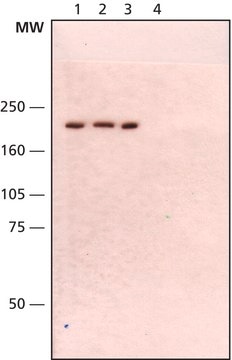MAK142
Fluorometric Intracellular Ros Kit
sufficient for 200 fluorometric tests (Deep red)
Synonyme(s) :
Intracellular ROS Fluorescence Assay
Se connecterpour consulter vos tarifs contractuels et ceux de votre entreprise/organisme
About This Item
Produits recommandés
Utilisation
sufficient for 200 fluorometric tests (Deep red)
Application(s)
cosmetics
food and beverages
Méthode de détection
fluorometric
Maladie(s) pertinente(s)
neurological disorders; cancer
Température de stockage
−20°C
Description générale
Reactive oxygen species (ROS) are generated as a result of the reduction of oxygen during aerobic respiration and by various enzymatic systems within the cell. At physiological levels, ROS contribute to cell signaling and host defense. Increased ROS generation, above the detoxification capacity of the biological system, results in oxidative stress and cellular damage. The main damage to cells results from the ROS-induced alteration of macromolecules such as polyunsaturated fatty acids in membrane lipids, essential proteins, and DNA. ROS has been implicated in disease states, such as Alzheimer′s disease, Parkinson′s disease, cancer, and aging.
Application
- Diethyl Blechnic Exhibits Anti-Inflammatory and Antioxidative Activity via the TLR4/MyD88 Signaling Pathway in LPS-Stimulated RAW264.7 Cells.: This article uses fluorometric methods to explore the anti-inflammatory and antioxidative properties of diethyl blechnic, illustrating the role of ROS assays in elucidating the molecular mechanisms underlying the therapeutic effects of natural compounds (Yang S et al., 2019).
Adéquation
This kit is suitable for the detection of intracellular ROS by fluorescence microplate reader, flow cytometer, or a fluorescent microscope with TRITC filter.
Principe
The Fluorometric Intracellular ROS Kit provides a sensitive, one-step fluorometric assay to detect intracellular ROS (especially superoxide and hydroxyl radicals) in live cells after 1 hour incubation. ROS react with a fluorogenic sensor localized to the cytoplasm, resulting in a fluorometric product proportional to the amount of ROS present. The assay can be performed in either a 96 or 384 multiwell plate format and with detection at λex = 650/λem = 675 nm.
Code de la classe de stockage
10 - Combustible liquids
Classe de danger pour l'eau (WGK)
WGK 3
Certificats d'analyse (COA)
Recherchez un Certificats d'analyse (COA) en saisissant le numéro de lot du produit. Les numéros de lot figurent sur l'étiquette du produit après les mots "Lot" ou "Batch".
Déjà en possession de ce produit ?
Retrouvez la documentation relative aux produits que vous avez récemment achetés dans la Bibliothèque de documents.
Les clients ont également consulté
Jian-An Pan et al.
Redox biology, 46, 102120-102120 (2021-09-04)
The dose-dependent toxicity to cardiomyocytes has been well recognized as a central characteristic of doxorubicin (DOX)-induced cardiotoxicity (DIC), however, the pathogenesis of DIC in the cardiac microenvironment remains elusive. Irisin is a new hormone-like myokine released into the circulation in
Tereza C Cardoso et al.
Journal of neurovirology, 22(6), 725-735 (2016-06-18)
Oncolytic viruses have the ability to infect tumor cells and leave healthy cells intact. In this study, bovine herpesvirus 1 (BHV1; Los Angeles, Cooper, and SV56/90 strains) and bovine herpesvirus 5 (BHV5; SV507/99 and GU9457818 strains) were used to infect
Sergio E L da Silva et al.
Archives of virology, 163(4), 1043-1049 (2018-01-06)
To establish an association between mitochondrial dysfunction and apoptosis following infectious bronchitis virus (IBV) infection, HD11 avian macrophage cells were infected with the Massachusetts 41 (M41) strain. Our results show that the M41 strain of IBV induced cytopathic effects followed
Bovine herpesviruses induce different cell death forms in neuronal and glial-derived tumor cell cultures.
Cardoso T C, et al.
Journal of Neurovirology, 22(6), 725-735 (2016)
The role of reactive oxygen species in the pathogenesis of Alzheimer?s disease, Parkinson?s disease, and Huntington?s disease: a mini review.
Manoharan S, et al.
Oxidative Medicine and Cellular Longevity, 2016 (2016)
Notre équipe de scientifiques dispose d'une expérience dans tous les secteurs de la recherche, notamment en sciences de la vie, science des matériaux, synthèse chimique, chromatographie, analyse et dans de nombreux autres domaines..
Contacter notre Service technique






